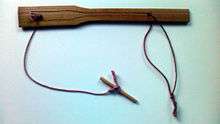Mukkuri

Mukkuri is a traditional Japanese plucked idiophone indigenous to the Ainu. The Mukkuri is made from bamboo and is 10 cm long and 1.5 cm wide. Similar to a jaw harp, sound is made by pulling the string and vibrating the reed as it is placed in the performer's mouth.[1]
Notable players

Notable skilled Mukkuri players are from Hokkaidō, and in 1964 the national broadcast station NHK recorded a film 北方民族の楽器 (Musical Instruments of the People of the North).[2] Umeko Andō (November 20, 1932 ‐ July 15, 2004) was a prominent figure who also sang Upopo Ainu songs and recorded them on CDs. A DVD titled けうとぅむ (keutumu) was produced to introduce Ando's life published post mortem in April 2006 by Education Board, Makubetsu-cho in Hokkaidō. Shigiko Teshi was another prominent Mukkuri player.
Daisuke Hare (1965-) played with Ando after he apprenticed under her. Hare organized the first Mukkuri competition in 2004 after he visited harpists in Sakha (Yakutia) Republic in 2003.
Akira Ifukube, noted for the soundtracks of the Godzilla movies, visited Ainu villages many times during his childhood. At one time, he encountered the sound of Mukkuri when he saw a girl playing it. He was rejected to learn it reasoned that Mukkuri should be played by female only, though there had been male players also. in 1997, Ifukube invited Umeko Ando to play for his biographical TV drama 北の交響曲 ("Kitano Kōkyōkyoku" Symphony of the North) produced and aired by Hokkaido Cultural Broadcasting (UHB).
Audio recordings
For many years since 1960s, audio recording for Ainu traditional music seldom included Mukkuri sounds. The audio recording of indeginious music of the world in 1973 did not include Ainu music, planned to publish them as a unique set, which was published with 3 audio CDs and a booklet.[3][4] Umeko Ando recorded largest number of Ainu music:
- 1994 安東ウメ子・ムックリの世界 ("Umeko Ando - the World of Mukkuri"), produced by Education Board, Makubetsu-cho. Audio CD.
- 1998 "Homage to the Rivers of the World" by Shigiko Teshi (recorded on June 19, 1998).[5]
- 1999 Hankapuy [6] Audio CD.
- 2001 イフンケ ("Ihunke" (Lullaby)) produced by OKI, an Ainu musician. Released from Tical Studio.[7] Solo album CD.
- 2002 シリピリカ ("Siripirika"), Education Board, Makubetsu-cho. Audio CD.
- 2003 ウポポサンケ ("Upoposanke"), Tical Studio.[8]
A sampling album "Spirits from Ainu" included a song "Inishueno Ibuki" which used Ando's singing voice, and that song was used in a visual DVD commemorating the designation of Shiretoko Cape as a UNESCO World Natural Heritage.[9]
Mukkuri is often accompanied with Tonkori, a plucked string instrument.
References
- ↑ There are digital audio files at The Foundation for Research and Promotion of Ainu Culture (FRPAC) , Mukkuri, May, 2009.
- ↑ page 91, "Ume Nishihira and Tonkori" (西平ウメとトンコリ)Boozilla (2006-01-30). "doo-bop days". Retrieved 2016-06-19.
- ↑ CD アイヌ・北方民族の芸能 (CD Ainu - Hopominzoku no geinō Performing Arts of Ainu and People of the North?)
- ↑ published by Japan Traditional Cultures Foundation. Three audio CDs for total 164 minutes. EAN: 4519239014314
- ↑ Included in a CD published with a book on Jaw harps of the world, "Kōkinno hibiku sekai".
- ↑ Featured musicians include Kazutoki Umezu on Saxophone and Kiyoshi Suzuki on drums. Produced by OKI. EAN: 4580163640023
- ↑ Ihunke (Audio CD)
- ↑ UPOPO SANKE (Audio CD)
- ↑ Composer Tiibe, singer Umeko Ando, Chelist Eijun Tsuchida. "Shiretoko - A Music Journey" (知床 - 音楽紀行 (Shiretoko, Ongaku kikō))
Bibliography
- Tadakawa, Leo (2005). Kōkinno hibiku sekai [The World Jaw Harp Resonates]. Nihon Kōkin Kyōkai. ISBN 978-4-9902-8470-1. Published with an audio CD and discusses Jaw Harp from around the world. An interview is included with Professor Emeritus Yoshiko Kojima of National Museum of Japanese Histories, an antholopologist.
External links
- Ainu Museum holds workshop for mukkuri craft and dance.
- The Foundation for Research and Promotion of Ainu Culture holds events involving mukkuri music.